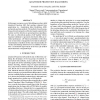Free Online Productivity Tools
i2Speak
i2Symbol
i2OCR
iTex2Img
iWeb2Print
iWeb2Shot
i2Type
iPdf2Split
iPdf2Merge
i2Bopomofo
i2Arabic
i2Style
i2Image
i2PDF
iLatex2Rtf
Sci2ools
105
click to vote
ICIP
2002
IEEE
2002
IEEE
Quantized projection data hiding
In this paper we propose a novel data hiding procedure called Quantized Projection (QP), that combines elements from quantization (i.e. Quantization Index Modulation, QIM) and spread-spectrum methods. The method is based in quantizing a diversity projection of the host signal, inspired in the statistic used for detection in spread-spectrum algorithms. We carry on a theoretical analysis of QP together with its empirical validation to rigorously show that it offers an excellent performance: QP features probabilities of decoding error several orders of magnitude lower than the aforementioned families of methods for the same dimensionality (diversity) and attacking distortion level. In addition we introduce a Costa-based improvement of the basic QP method named Distortion Compensated QP.
Basic Qp Method | Distortion Compensated QP | ICIP 2002 | Image Processing | QP Features Probabilities |
Related Content
| Added | 24 Oct 2009 |
| Updated | 24 Oct 2009 |
| Type | Conference |
| Year | 2002 |
| Where | ICIP |
| Authors | Fernando Pérez-González, Félix Balado |
Comments (0)

